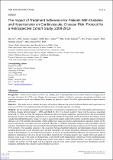The impact of treatment adherence for patients with diabetes and hypertension on cardiovascular disease risk : a protocol for a retrospective cohort study, 2008-2018
Abstract
Background: Cardiovascular disease (CVD) is the leading cause of death globally and in Canada. Diabetes and hypertension are major risk factors for CVD events. Despite the increasing availability of effective treatments, the majority of diabetic and hypertensive patients do not have adequate blood pressure and glycemic control. One of the major contributors is poor treatment adherence. Objective: This study aims to evaluate the impact of treatment adherence for patients with both diabetes and hypertension on acute severe CVD events and intermediate clinical outcomes in Canadian primary care settings. Methods: We will conduct a population-based retrospective cohort study of patients living with both diabetes and hypertension in Ontario, Canada, between January 1, 2008, and March 31, 2018. The Social Cognitive Theory will be used as a conceptual framework by which to frame the reciprocal relationship between treatment adherence, personal factors, and environmental determinants and how this interplay impacts CVD events and clinical outcomes. Data will be derived from the Diabetes Action Canada National Data Repository. A time-varying Cox proportional hazards model will be used to estimate the impacts of treatment adherence on CVD morbidity and mortality. Multivariable linear regression models and hierarchical regression models will be used to estimate the associations between treatment adherence of different medication categories and intermediate clinical outcomes. Our primary outcome is the association between treatment adherence and the risk of acute severe CVD events, including CVD mortality. The secondary outcome is the association between treatment adherence and intermediate clinical outcomes including diastolic and systolic blood pressures, glycated hemoglobin, low-density lipoprotein cholesterol, and total cholesterol. Owing to data limitation, we use medication prescriptions as a proxy to estimate treatment adherence. We assume that a patient adhered to medications if she or he had any prescription record in the 4 preceding quarters and 1 quarter after each quarter of interest. Acute severe CVD events are defined based on the World Health Organization’s Monitoring Trends and Determinants in Cardiovascular Disease Project, including acute coronary heart disease, stroke, and heart failure. As causes of death are not available, the number of CVD deaths will be computed using the most recent systolic blood pressure distributions and the population attributable risks related to systolic blood pressure level. Results: The project was funded by Diabetes Action Canada (reference number: 503854) and approved by the University of Toronto Research Ethics Board (reference number: 36065). The project started in June 2018 and is expected to be finished by September 2019. Conclusions: The findings will be helpful in identifying the challenges of treatment adherence for diabetic and hypertensive patients in primary care settings. This will also help to develop intervention strategies to promote treatment adherence for patients with multi-morbidities.
Citation
Su , M , Haldane , V , Upshur , R , Sullivan , F , Garda , F L A , Greiver , M & Wei , X 2019 , ' The impact of treatment adherence for patients with diabetes and hypertension on cardiovascular disease risk : a protocol for a retrospective cohort study, 2008-2018 ' , JMIR Research Protocols , vol. 8 , no. 5 , e13571 . https://doi.org/10.2196/13571
Publication
JMIR Research Protocols
Status
Peer reviewed
ISSN
1929-0748Type
Journal article
Description
The study received partial in-kind funding from Diabetes Action Canada (503854).Collections
Items in the St Andrews Research Repository are protected by copyright, with all rights reserved, unless otherwise indicated.

